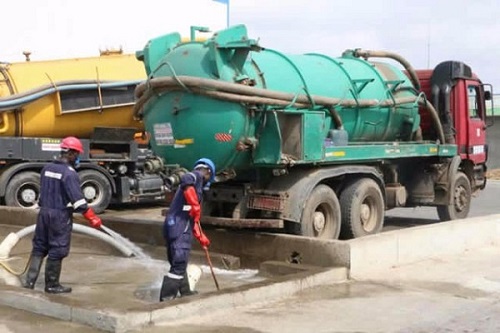Management of Lavender Hill Faecal and Mudor Waste Treatment Plant in Accra say the cost of operation is going up as the facility is inundated with foreign materials in sewage transported for treatment.
According to the management of Lavender Hill Treatment Plant, remains of aborted fetuses, condoms, mobile phones, sanitary pads, diapers, jeans, shoes dumped into Sewerage systems and toilet facilities are common foreign materials which surface during the treatment processes.
Chemical Engineer/Head of Process Engineering at Lavender Hill Treatment Plant, Eric Simon Amofa-Sarkodie in an interview with Starr FM during a visit by members of Pentecost Media Guild said is a worry to management thus urging residents to desist from discarding foreign materials into the toilets and Sewerage facilities.
“When they are dislodging the wastewater, we mostly notice foreign materials such as condoms, aborted babies, money, mobile phones, jeans, pads, shoes everything. For the phones I could adduce that it happens when people go to toilet with their mobile phones in their pockets. We have machines that will remove all these materials from the faecal waste because when we allow it to pass it could cause damage to the treatment plant. All this comes as a cost to usâ€.
The 2,400 cubic-meter capacity Lavender Hill Faecal and Mudor Waste Treatment Plant established in 2016 has been a game changer to Ghana’s liquid waste management curbing indiscriminate discharge of untreated liquid waste into the sea which was accompanied with very serious environmental implications including water and air pollution.
“..For almost three years now the stench that those people living around Korle-Lagoon and James town were experiencing is no more. Because the stench came about by the disposal of the raw faecal waste into the sea,†the Chemical Engineer / Head of Process Engineering,Eric Simon Amofa-Sarkodie stated.
According to him, sewerage systems have been connected to homes in parts of Accra that carries wastewater straight to the facility adding that “currently the facility treats about 200 cubic-meters of wastewater which is about 250 trucks a day. We get about 307 trucks in a day we have the capacity to receive more than that because we have storage facility for that.â€
He revealed that the facility will soon generate 7.5 megawats of power from biogas generated from the wastewater which is currently being flared because the facility is not ready to convert it into electricity.
He also said Management of the facility is undertaking laboratory tests and regulatory procedures to get approval for commercial manufacturing of bio-Charcoal from the sewage sludge which will replace biomass charcoal noted to have effect on forest conservation.
Â





